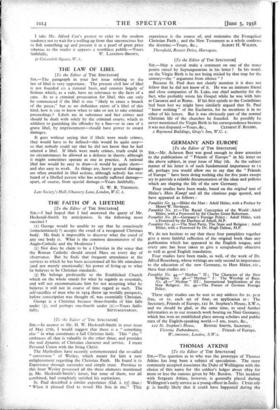THE FAITH OF A LIFETIME
[To the Editor of THE SPECTATOR]
Sra,—I had hoped that I had answered the query of Mr. Heckstall-Smith by anticipation. Is the following more succinct ?
(x) George would be -unable to say that he consciously (conscientiously ?) accepts the creed of a recognised Christian body. Be finds it impossible to discover what the creed of any one body is. What is the common denominator of the Anglo-Catholic and the Modernist ?
(2) Nor does he claim to be a Christian in the sense that the Roman Catholic should attend Mass on every day of observance. But he finds that frequent attendance at the services to which he has been accustomed all his life stimulates (and not merely emotionally) his power of living up to what he believes to be Christian standards.
(3) He belongs professedly to the Established Church which on the whole stands for what he regards as essentials, and will not excommunicate him for not accepting what he believes it will not in course of time regard as such. The self-sacrifice of men who in 1914 threw up worldly prospects, before conscription was thought of, was essentially Christian.
George is a Christian because three-fourths of him falls under (3), and perhaps one-fourth under (2).—Yours faith-


















































 Previous page
Previous page